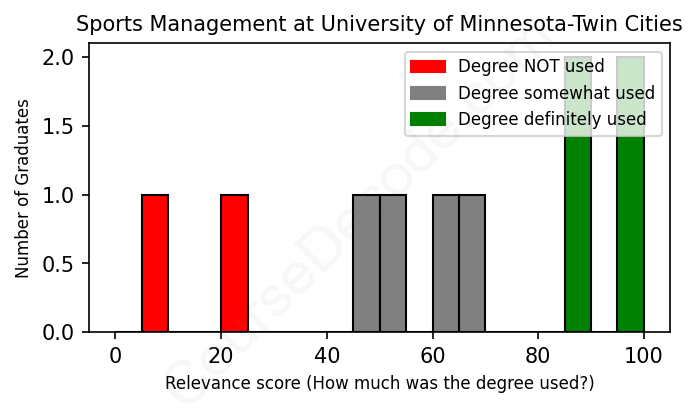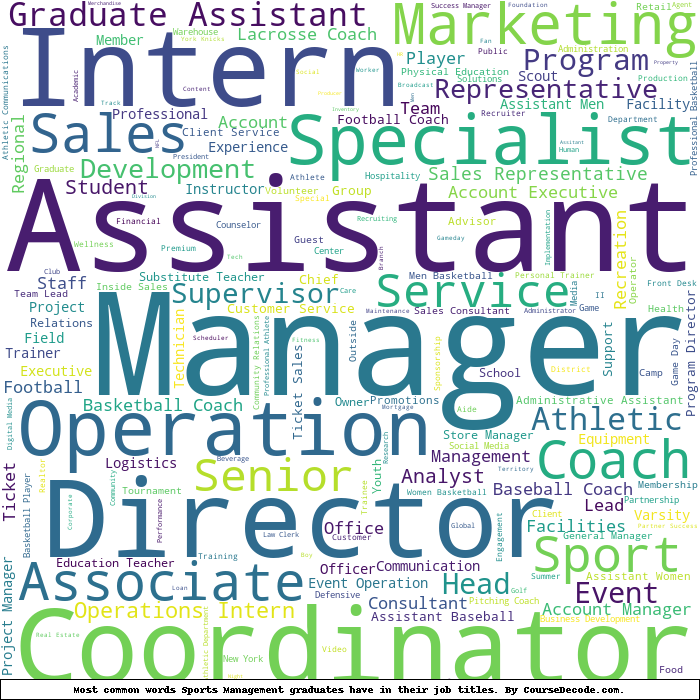
First, some facts. Of the Sports Management graduates from University of Minnesota-Twin Cities we've analyzed , here's how many have used (or NOT used) their degree in their career:

These are estimates based on AI analysis of 10 LinkedIn profiles (see below).
The verdict? Slightly below average. Overall, with an average relevance score of 62%, Sports Management graduates from University of Minnesota-Twin Cities have a slightly lower likelihood (-5%) of finding work in this field compared to the average graduate across all fields:
And for comparison, here's the chart for all profiles we've looked at across all degrees.
Also, after graduating, only 30% of these graduates have pursued further education other than another Bachelor's degree (such as a Masters degree or other), compared to the average across all profiles of 35%. This suggests a Bachelors degree is enough for most Sports Management graduates, and it's normal to look for work straight after graduation.
See the details:
|
Relevance score: 88% We think this person has gone into a career highly relevant to their degree. We think this person has gone into a career highly relevant to their degree.
DEGREE INFOGraduated in 2018 from University of Minnesota-Twin Cities with a Bachelor of Science - BS in Sports Management. No other secondary education since. JOB HISTORY SINCE GRADUATIONNFL Honors Talent Wrangler National Football League (NFL) Feb 2018 - Feb 2018 Athletic Department Intern  Hopkins High School Jan 2018 - Jun 2018 Employee Development Specialist  LJ&A Employment Counseling & Placement Services, LLC May 2018 - Nov 2018 Fitness Center Staff and Administrative Specialist  EXOS Oct 2018 - Feb 2019 Assistant League Manager  KEVASports Feb 2019 - Sep 2022 League Director  KEVASports Aug 2021 - Sep 2022 Sports Coordinator  National Sports Center Sep 2022 - Present ABOUTBackground of working in the recreational facilities, professional sports and services industry. Skilled in Problem Solving, Management, Teamwork, Leadership, Communication and Microsoft Office. Strong professional with a Bachelor of Science - BS focused in Sport Management from University of Minnesota-Twin Cities. |
The top 10 most common jobs done by the graduates we've analyzed (ranked most common to least) are:
From what I've seen, people who graduated from the University of Minnesota-Twin Cities with a degree in Sports Management have landed in a pretty diverse mix of jobs. Some of the most common roles they've taken up seem to revolve around event management, coaching, and administrative positions in sports organizations. For instance, positions like Event Operations Coordinator and Athletic Director are prime examples of jobs that directly utilize their skills and knowledge in sports management. It makes sense, given that these roles require a firm grasp of the principles they learned during their studies and often involve planning, coordination, and oversight of sports programs.
That said, not every job these graduates have taken is directly related to sports management. There are quite a few instances where individuals ended up in roles that don’t really tap into the core competencies of their degree, like customer service or project management in unrelated fields. While some positions might have overlapping skills, such as teamwork or organization, they often don't fully utilize the sports management expertise gained during their education. So, while many do find engaging roles in sports-related fields, a good number also venture into jobs that don’t fully exploit their specialization. It’s a mixed bag, really, showcasing both the potential and the challenges of the sports management career path.
Here is a visual representation of the most common words in job titles for Sports Management graduates (this is across all Sports Management graduates we've analyzed, not just those who went to University of Minnesota-Twin Cities):

It looks like graduates from the University of Minnesota-Twin Cities who studied Sports Management have taken a variety of career paths after graduation. For many, their first jobs tend to be focused on roles like coordinators or assistants within sports organizations, which makes sense given that they’re fresh out of school and eager to jump into the sports industry. A notable example includes alumni who started as Event Operations Coordinators or in other support roles for professional teams. This suggests that they typically look for positions closely aligned with their degree, often within the sports domain, as their initial move into the workforce.
However, as time goes on—five years out or even ten—it seems there's a mix. Some graduates have indeed moved up the ranks within the sports industry, holding positions like Athletic Director or Event Operations Manager, which are fantastic steps for a Sports Management major. Others, though, veer off the path into unrelated fields like consulting or healthcare, as seen with graduates working in positions that don’t seem to directly relate to sports. While some have managed to stay connected to sports and transition into meaningful roles, others might not find the opportunities within their field, highlighting the variability in career trajectories for these graduates. Overall, it’s clear that while many start strong in sports-related roles, there’s no one-size-fits-all route to success after earning a degree in this field.
Honestly, a Bachelor’s degree in Sports Management can be a bit of a mixed bag in terms of difficulty. At the University of Minnesota-Twin Cities, it’s not necessarily the hardest program out there, but it does have its challenges. You’ll take a mix of business courses, like marketing and finance, along with your sports-specific classes, which means balancing different types of coursework. If you’re passionate about sports and willing to put in the effort, you’ll probably find it manageable, but don’t underestimate the time it takes to stay on top of readings, projects, and group work. Overall, it’s a solid program, and if you stay organized and engaged, you’ll likely do just fine!
Most commonly, in the LinkedIn profiles we've looked at, it takes people 4 years to finish a Bachelor degree in Sports Management.
Looking at the career paths of these Sports Management grads from the University of Minnesota-Twin Cities, it seems like there's a pretty mixed bag when it comes to earnings. Some have landed decent roles in schools and sports organizations, especially those who've climbed the ladder at places like Minnesota United FC, which could offer a good paycheck. On the flip side, some folks started off in internships or lower-tier positions that likely don't pay as well, like those coaching roles or entry-level sales jobs. Overall, while a few seem to be doing well, a lot of their jobs, especially in the beginning, might not come with a fat paycheck, so it’s a bit of a struggle at first for many. But hey, that's how it goes in the sports world – you gotta work your way up!
Here is a visual representation of the most common words seen in the "about" section of LinkedIn profiles who have a Bachelor degree in Sports Management (this is across all Sports Management graduates we've analyzed, not just those who went to University of Minnesota-Twin Cities). This may or may not be useful:

Here are all colleges offering a Bachelor degree in Sports Management (ordered by the average relevance score of their Sports Management graduates, best to worst) where we have analyzed at least 10 of their graduates: